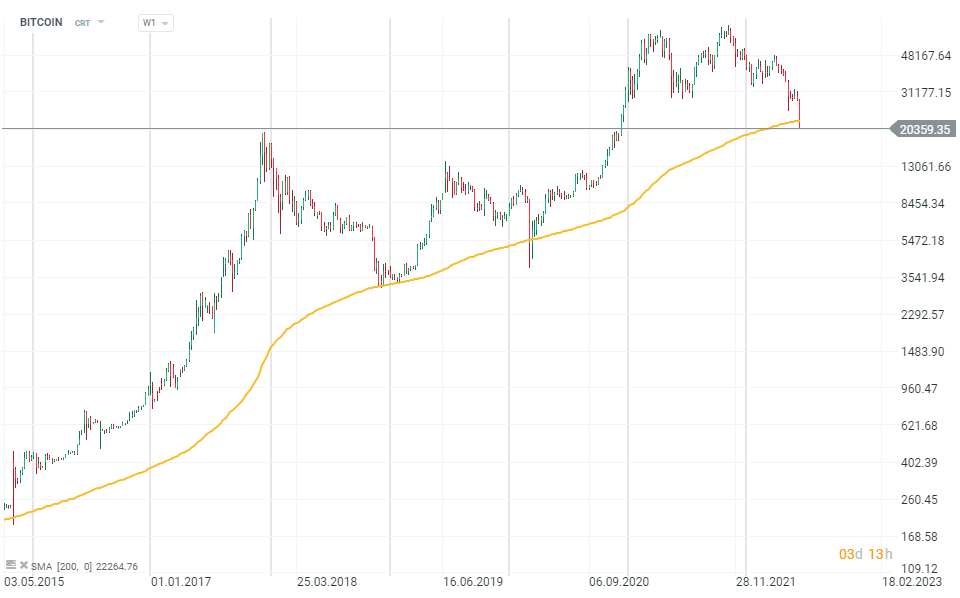Cryptocurrencies have been in a downtrend since November 2021, but recent weeks have been particularly painful for digital assets. Weak sentiment persists not only among investors focused on the cryptocurrency market, but also on stock market indices, which have had one of the weakest six months in stock market history.
What's behind the declines?
Friday's alarming data reading from the U.S. economy, which combined with already bruised market sentiment, caused an exponential sell-off on the indices, which dragged down cryptocurrencies. Record-low consumer sentiment and a surprisingly higher inflation reading from the U.S. economy raise concerns around an aggressive monetary tightening cycle by the Federal Reserve. The rise in cryptocurrencies has coincided with a period of unprecedentedly loose monetary policy and this is no coincidence. The beneficiaries of this economic environment included Bitcoin and other smaller cryptocurrencies, which are losing mightily today amid a change in central bank policy and risk aversion among investors.
The theory that Bitcoin protects against inflation, which fans of digital assets have tried to promote, so far proves to be unsubstantiated, and the limited supply of Bitcoin has proven to be an insufficient argument for the appreciation. Cryptocurrencies, as risky assets similar to tech stocks, tend to lose first when investor sentiment weakens. At the same time, however, they can make powerful gains when risk appetite grows and sentiment improves. As with stocks, cryptocurrency valuations are primarily driven by market liquidity and the price of money. Since the summer of 2020, the former was in surplus, the latter was ridiculously low. This is now reversing at a dizzying pace.
With rising inflation and uncertainty, investment opportunities for retail investors are melting away. Financial institutions are aware of this and may hold off on major cryptocurrency purchases until they are assured of an improving global economy. Panic sell-offs in the past have sometimes been buying opportunities in the cryptocurrency market. Still, there are no events on the horizon that could prompt large capital to return to the market.
Problems in the crypto market
Inflation and the price of money are not everything. Recent days have also been full of events relevant to the cryptocurrency market itself. The industry is facing a decline in confidence towards digital assets and the decentralized financial services promoted in 2021, independent of the banking system.
The crash of Luna sowed seeds of uncertainty among investors, and these have recently been fueled by problems with the Ethereum network, the suspension of withdrawals from the largest cryptocurrency exchange Binance, and the blocking of withdrawals and transfers at the decentralized financial platform Celsius. The platform offered advanced forms of so-called 'DeFi' that is, among other things, cryptocurrency loans or other forms of credit. At this moment, it seems that the project is insolvent, and this means losses going into billions of dollars. The cryptocurrency market fears intervention and a wider audit by regulators, which could potentially expose fraud and financial pyramid schemes in the DeFi space.
Investor concerns have also grown around the second largest cryptocurrency, Ethereum, whose transformation to the highly anticipated 2.0 version has once again been postponed by developers. All this combined with dire data from the economy and a sell-off in major stock market indices created a supply bomb effect that exploded in the crypto market causing massive sell-offs.
When to expect a rebound in the price of Bitcoin?
Bitcoin is a highly volatile asset, but over the past 12 years it has given investors far greater returns than the S&P500 index or the stocks of major technology companies. The cryptocurrency market is characterized by 'exaggerated reactions' and price fluctuations of several tens of percent are not unusual for its participants.
Predicting a price bottom now seems extremely difficult, as the market and macroeconomic circumstances are incomparable to previous years. Bitcoin has slipped below its 200-week moving average near $22,000, which has resulted in further price declines of tens of percent in previous cycles. Bitcoin's price has fallen as much as 85% during downturns, and this would mean a price drop in the neighborhood of $10,000. The catalyst for such a move could be the possible collapse of stablecoin Tether, whose capitalization is seven times larger than Celsius and whose fundamentals are equally questionable.
At the same time, the situation does not have to repeat itself at all; in previous cycles, the involvement of institutions in the cryptocurrency market and the general awareness of crypto market participants were small compared to today's situation. Nevertheless, if central banks signal a more hawkish approach in the conduct of monetary policy and uncertainty in the broad market fails to find a catalyst for stabilization, it could trigger further perturbations in the digital asset market.
 Bitcoin has broken multi-year support set by the 200-week moving average (SMA 200). Chart on a logarithmic scale. Source: xStation 5
Bitcoin has broken multi-year support set by the 200-week moving average (SMA 200). Chart on a logarithmic scale. Source: xStation 5

Reggeli összefoglaló (12.02.2026)

🚨 A Bitcoin 69 000 dollárra esett vissza 📉 1:1 korrekciós forgatókönyv?

Talpra Tréder - 2026.02.09.

Reggeli összefoglaló (06.02.2026)
Ezen tartalmat az XTB S.A. készítette, amelynek székhelye Varsóban található a következő címen, Prosta 67, 00-838 Varsó, Lengyelország (KRS szám: 0000217580), és a lengyel pénzügyi hatóság (KNF) felügyeli (sz. DDM-M-4021-57-1/2005). Ezen tartalom a 2014/65/EU irányelvének, ami az Európai Parlament és a Tanács 2014. május 15-i határozata a pénzügyi eszközök piacairól , 24. cikkének (3) bekezdése , valamint a 2002/92 / EK irányelv és a 2011/61 / EU irányelv (MiFID II) szerint marketingkommunikációnak minősül, továbbá nem minősül befektetési tanácsadásnak vagy befektetési kutatásnak. A marketingkommunikáció nem befektetési ajánlás vagy információ, amely befektetési stratégiát javasol a következő rendeleteknek megfelelően, Az Európai Parlament és a Tanács 596/2014 / EU rendelete (2014. április 16.) a piaci visszaélésekről (a piaci visszaélésekről szóló rendelet), valamint a 2003/6 / EK európai parlamenti és tanácsi irányelv és a 2003/124 / EK bizottsági irányelvek hatályon kívül helyezéséről / EK, 2003/125 / EK és 2004/72 / EK, valamint az (EU) 2016/958 bizottsági felhatalmazáson alapuló rendelet (2016. március 9.) az 596/2014 / EU európai parlamenti és tanácsi rendeletnek a szabályozási technikai szabályozás tekintetében történő kiegészítéséről a befektetési ajánlások vagy a befektetési stratégiát javasló vagy javasló egyéb információk objektív bemutatására, valamint az egyes érdekek vagy összeférhetetlenség utáni jelek nyilvánosságra hozatalának technikai szabályaira vonatkozó szabványok vagy egyéb tanácsadás, ideértve a befektetési tanácsadást is, az A pénzügyi eszközök kereskedelméről szóló, 2005. július 29-i törvény (azaz a 2019. évi Lap, módosított 875 tétel). Ezen marketingkommunikáció a legnagyobb gondossággal, tárgyilagossággal készült, bemutatja azokat a tényeket, amelyek a szerző számára a készítés időpontjában ismertek voltak , valamint mindenféle értékelési elemtől mentes. A marketingkommunikáció az Ügyfél igényeinek, az egyéni pénzügyi helyzetének figyelembevétele nélkül készül, és semmilyen módon nem terjeszt elő befektetési stratégiát. A marketingkommunikáció nem minősül semmilyen pénzügyi eszköz eladási, felajánlási, feliratkozási, vásárlási felhívásának, hirdetésének vagy promóciójának. Az XTB S.A. nem vállal felelősséget az Ügyfél ezen marketingkommunikációban foglalt információk alapján tett cselekedeteiért vagy mulasztásaiért, különösen a pénzügyi eszközök megszerzéséért vagy elidegenítéséért. Abban az esetben, ha a marketingkommunikáció bármilyen információt tartalmaz az abban megjelölt pénzügyi eszközökkel kapcsolatos eredményekről, azok nem jelentenek garanciát vagy előrejelzést a jövőbeli eredményekkel kapcsolatban.


